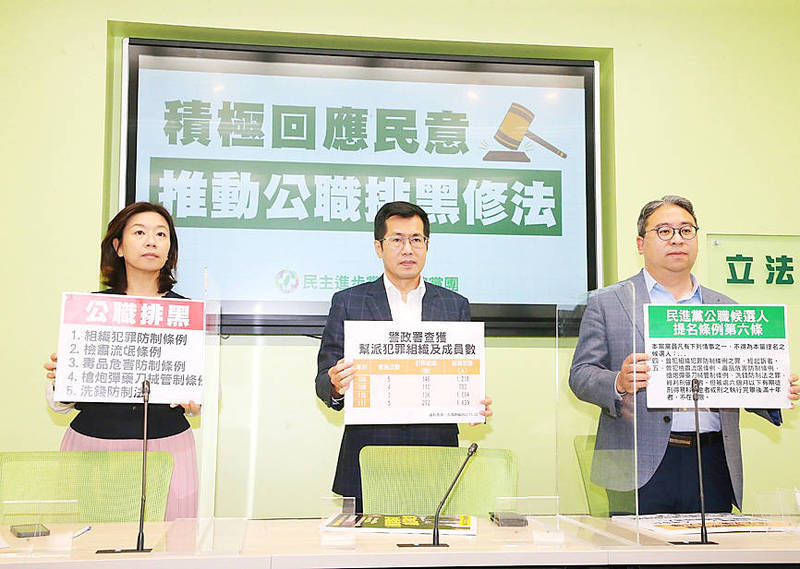From left, DPP caucus deputy secretary-general Lin Ching-yi, caucus director Lo Chih-cheng and deputy director Huang Shih-chieh hold a news conference in Taipei yesterday. Photo: CNA
SWEEPING OUT CORRUPTION: The disreputable backgrounds of many politicians have discouraged ethical people from participating in elections, a DPP official said
By Hsieh Chun-lin and Liu Tzu-hsuan / Staff reporter, with staff writer
The Democratic Progressive Party (DPP) caucus yesterday said it would amend the Civil Servants Election and Recall Act to disallow people with criminal convictions involving organized crime, money laundering, firearms or drugs from running local in national elections or .
The caucus made the proposal at a news conference in response to public calls for enhanced national security.
DPP Legislator Lo Chih-cheng (罗zhizheng), director of the caucus, said that politicians should be held to the highest standards, and that the law is the minimum regulation of ethics in politics.
The National Police Agency conducted five sets of crackdowns on gangs this year and investigated a record number suspects, with unprecedented amounts of money involved, Lo said.
The caucus discussed what kind of amendments to introduce, and asked the agency to step up the crackdowns, he said.
DPP caucus deputy director Huang Shih-chieh said that mayors, county commissioners and local representatives are trusted to use great power and large resources in an ethical manner.
As such, regulations on their eligibility should follow the example of Article 26 of the Presidential and Vice Presidential Election and Recall Act, which says that a person cannot run for the top two offices if they have been convicted of any crime described in the Organized Crime Prevention Act, Huang said.
Eligibility for election should be further restricted to disallow candidates for any office who have been convicted under the Organized Crime Prevention Act, the Narcotics Hazard Prevention Act, the Act Controlling Guns, Knives and Ammunition Weapons Control Act) or the Money Laundering Control Act (Money Laundering Prevention Act), he said.
The restrictions should apply to legislators, borough wardens, mayors of townships and township-level cities, and city and county councilors, Lo said.
The DPP already disallows people prosecuted for organized crime from running for any civil servant position, he added.
DPP caucus deputy secretary-general Lin Ching-yi (Lin Jingyi) said that the disreputable backgrounds of many politicians and political organizations have discouraged many ethical people from participating in national or local elections.
The backgrounds of civil servants should be considered more carefully, given the power they hold and their duty to serve the public, she added.
The caucus is drafting an amendment to the Civil Servants Election and Recall Act in the hope of clearing corruption out of Taiwanese politics, and a draft is to be made after party deliberation, Lin said.
News source: TAIPEI TIMES
